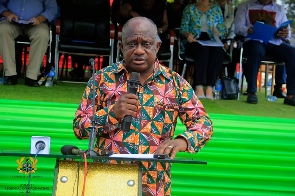The Ashanti Regional Minister Hon Simon Osei Mensah on Monday, October 10, 2022, commissioned three Water, Sanitation, and Hygiene (WASH) Projects in the Region. The WASH projects which were financed by UNICEF with support from the Danish Government provided three ultramodern toilet facilities for three basic schools in the region. The Kumasi Metropolitan Assembly, Kwadaso Municipality, and the Asokore Mampong Municipality are the beneficiary assemblies. In attendance at the event were the Danish Ambassador to Ghana, H. E Tom Noring, and the Country Rep for UNICEF, Anne-Claire. Commissioning one of the projects at Kwadaso M/A Basic school, Hon Simon Osei Mensah commended the WASH programme and noted that, the project has come at a time the region was keen on improving the sanitation of people, especially girls and women. "Growing up in a clean and safe environment is every child’s right. Access to clean water, basic toilets, and good hygiene practices not only keep children thriving but also give them a healthier start in life," he said Hon Simon Osei Mensah assured the Danish Ambassador and UNICEF country Rep of government’s preparedness to support any projects that will improve both, the economic and social well-being of the people of Ghana. For his part, the Danish Ambassador to Ghana Tom Noring pledged the Danish government’s commitment to supporting girl child education. He added that the projects were also to help Ghana completely overcome the Covid-19 pandemic. "Despite COVID-19 putting the spotlight on the importance of hand hygiene to prevent the spread of disease, there billion people worldwide, are hundreds of millions of school-going children, who do not have access to handwashing facilities with soap.” “People living in rural areas, urban slums, disaster-prone areas, and low-income countries are the most vulnerable and the most affected," he said. "This is the main reason why we have teamed up with UNICEF to provide WASH facilities to schools in Ghana,” he noted.
Regional News of Wednesday, 12 October 2022
Source: otecfmghana.com

















